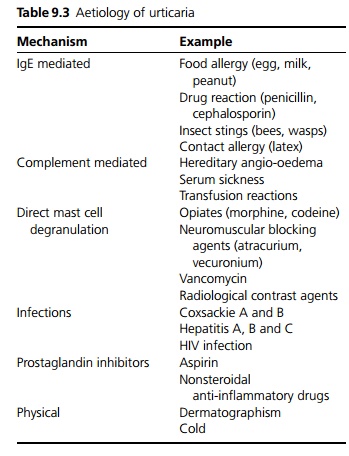Chapter: Medicine and surgery: Dermatology and soft tissues
Urticaria - Erythematous lesions
Urticaria
Definition
Urticaria is an itchy erythematous eruption ranging from nettle rash to large weals/plaques with palpable skin oedema. Most cases of urticaria are acute and self-limiting within a few hours, occasionally with recurrent episodes for up to 6 weeks. Acute urticaria often has an identifiable trigger. Chronic urticaria lasts from 6 weeks and up to 10 years. There is often no identifiable trigger in chronic urticaria.
Prevalence
Affects up to 25% of the population.
Age
Most common in children and young adults.
Sex
M = F
Aetiology
Aetiological agents for urticaria are given in Table 9.3. Rarely urticaria may bepart of a systemic disease, such as systemic lupus erythematosus, or autoimmune thyroid disease and may be the presenting feature.

Pathophysiology
Urticaria results from the degranulation of cutaneous mast cells causing dilation of local capillaries and leakage of fluid into the skin. Mediators include histamine.
Clinical features
Rapid onset of itchy erythematous swellings or weals anywhere on the body. The accompanying soft tissue oedema (angiooedema) often occurs around the face including the tongue and larynx causing potentially life-threatening upper airways obstruction, presenting as stridor.
Management
The management of anaphylaxis is discussed on page 499. Any trigger factor should be identified and avoided wherever possible. Medical treatment is used for symptom relief in acute urticaria and chronic urticaria where triggers are not identifiable.
1. Antihistamines
H1 receptor blockers such as loratadine are the mainstay of treatment.
H2 receptor blockers such as ranitidine may be useful in conjunction with an H1 blocker in refractory cases.
2. Corticosteroids may be useful in individuals in whom antihistamines are ineffective. Prolonged courses in chronic urticaria are associated with significant side effects and adrenal suppression.
Related Topics